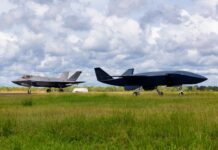Boeing has joined the Airbus-led team vying to fulfil the United Kingdom’s New Medium Helicopter (NMH) requirement. Its UK-based subsidiary, Boeing Defence UK, will act as the training services partner on the team, which is bidding Airbus Helicopters’ H175M platform for the requirement.
The news that Boeing has joined the ‘H175M Task Force’, which was announced by Airbus on 6 March 2023, clears up one point of uncertainty in the contest: of the four companies announced as having passed the dynamic pre-qualification questionnaire (DPQQ) stage of the programme in November 2022 – Airbus Helicopters, Leonardo Helicopters, Sikorsky and Boeing – only the latter had not announced a contending platform. Beyond Airbus’ H145M, the other helicopters being bid are the Leonardo AW149 and the Sikorsky (Lockheed Martin) S-70M Black Hawk.
Boeing’s role in the team, should the H175M be selected, would be to provide aircrew, groundcrew and maintenance training for the aircraft. The Airbus team also has on board Babcock as support partner, Pratt & Whitney Canada as the provider of the helicopter’s PT6C-67E turboshaft powerplant, Martin-Baker to provide specialist troop seating and cabin integration, and Spirit AeroSystems for detailed design and manufacturing activities.

The schedule for the NMH programme has slipped in recent months. Although a request for proposals (RfP) for the programme was originally expected in the autumn of last year, the UK Ministry of Defence (MoD) indicated on 21 October 2022 that this had been revised to a date “later this financial year”, meaning that it could come as late as the first week of April 2023.
The out-of-service date (OSD) for the RAF’s fleet of 23 Puma HC2s, which form the bulk of the NMH requirement, is March 2025, meaning that the programme schedule is now looking quite tight. However, the MoD has noted that this OSD “will remain under review based on operational and non-operational commitments”.
Peter Felstead






![New developments in multirole helicopters French helicopters operating in Mali. Shown here are the Tiger (Top), H225M (background left), and NH90 (foreground, right). [Airbus]](https://euro-sd.com/wp-content/uploads/2025/09/French-NH90H225MTiger-in-Mali-Copyright-Airbus-Kopie-218x150.jpg)
![Doing everything at once This image gives a good indication of how many RF antennas a modern combat aircraft must have; these are just for the plane’s electronic warfare system. [BEL]](https://euro-sd.com/wp-content/uploads/2025/09/BEL-EW-Suite-Antennas-BEL-Kopie-218x150.jpg)
![Hypersonic weapon interceptor developments The US MDA plans to conduct Flight Test Aegis Weapon System-43 (FTM-43) with the goal of using an upgraded Standard Missile-6 (SM-6) to physically intercept an HTV-1 hypersonic target. [MDA]](https://euro-sd.com/wp-content/uploads/2025/09/SM-6-_-8314132-Kopie-218x150.jpg)



